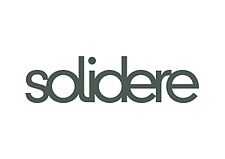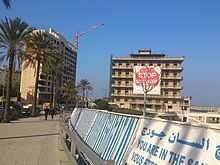Solidere
 | |
| Public | |
| Industry | Real estate |
| Founded | 1994 |
| Founder | Rafic Hariri |
| Headquarters | Beirut, Lebanon |
Area served | Beirut Central District |
Key people | Nasser Chammaa (Chairman), Mounir Douaidy (General Manager) |
| Slogan | Developing the finest city center in the Middle East |
| Website | www.solidere.com |
Solidere s.a.l. is a Lebanese joint-stock company in charge of planning and redeveloping Beirut Central District following the conclusion, in 1990, of the country’s devastating civil war. By agreement with the government, Solidere enjoys special powers of eminent domain as well as a limited regulatory authority codified in law, making the company a unique form of public-private partnership.
Solidere was founded on 5 May 1994 by then-Prime Minister Rafik Hariri and was incorporated as a privately owned company listed on the stock exchange. The name “Solidere” stands for Société libanaise pour le développement et la reconstruction de Beyrouth, French for “The Lebanese Company for the Development and Reconstruction of Beirut.”
Projects
Solidere is widely credited as the most important force behind Beirut’s reemergence, in recent years, as a bustling urban destination with a chance to earn back its ancient title of “Paris of the Middle East", even though it would be at the price of demolishing its charm. Solidere's main functions are the supervision of the government-authorized reconstruction plan, financing and developing the infrastructure, new construction and rehabilitation of war-torn structures, urban landscaping and the management of property.[1] Solidere has worked to attract global retailers such as Virgin Megastores to Beirut Central District. The company’s most significant single project to date has been Beirut Souks, a 100,000 m2 retail center that was scheduled to open by year 2008, however opened in 2009. Other ongoing developments include the Hadiqat As-Samah (Garden of Forgiveness), Platinum Tower and the Marina Towers luxury residential complex, and now very majorly the Beirut Gate and Phoenician village projects planned for the near future.
Controversy and challenges

Solidere is criticized for having destroyed the social fabric of "Centre-Ville" (aka Downtown Beirut), because of its very controversial methods which consisted in forcing the ancient inhabitants and shop owners of the city to exchange their property for shares in the company. Also, these shares were not worth the real value of their properties. The ancient owners who didn't accept to become shareholders were driven out of the place without indemnisation.
Furthermore, opponents to this project reported the lack of concern for the legitimate ancient inhabitants of the old city, the Rafik Hariri family having not asked their opinion about their project.
Within just a year of Solidere’s establishment, legal challenges were mounted, attempting to halt some of its planned demolitions and questioning its methods of compensating the owners of buildings in its development areas with shares, rather than cash. Allegations emerged that the Hariri family abused power and forced through demolition orders and harassed reluctant owners. The cases of more than 50 former building owners from the downtown area were taken up by Lebanese human rights lawyer Dr. Muhamad Mugraby.
In 2007, Mugraby claimed in the Lebanese Daily Star newspaper that “Solidere is a Lebanese form of vigilantism under color of the law. It violates the Constitution, which prohibits the confiscation of property without prompt compensation and only for the public good. Most of the people who were hurt were not strictly the property owners but the occupants or lease holders, whose rights were taken away by law 117 and given to Solidere.”
In addition to raising legal claims, groups of property rights holders from Beirut’s Central District have also called for the legislation which allowed Solidere’s innovative remuneration structure to be declared unconstitutional and annulled, and civil society organizations calling for greater transparency and accountability from Solidere have been among Lebanon’s most vociferous.[2]
Since 2010 and the beginning of the Syria Civil War-and the exacerbation of violence in Lebanon, proof has been given to those that were claiming that Beirut downtown was no longer for Lebanese people but for strangers, mostly Arab from the UAE, Saudi Arabia and Kuwait that they were right: the Downtown Beirut district has been empty because the embassies of these countries asked their nationals to avoid any unnecessary travel to Lebanon.[3]
Financials
Solidere’s shares are listed on the Beirut and Kuwait Stock Exchange, and its Global Depository Receipts trade on the London, Frankfurt and Luxembourg Stock Exchanges. Its share price on the Beirut exchange has risen sharply in recent years, from about US$5 in early 2004 to a high of US$26 in February 2006.[4] In June 2006, Solidere approved a US$100M dividends payout to its shareholders.
Most of Solidere’s investors are European and North American investment firms or Arab investors from the Gulf. Rafik Hariri's share in the company has been a controversial subject in the Lebanese political spectrum. Some rumors say that he owned a majority stake in Solidere before his assassination in 2005, and the Hariri family continues to be a principal shareholder today. However, the Hariri family rejected those rumors saying that Rafik Hariri owned only 6% of the company's shares.[5]
See also
References
- ↑ Elsheshtawy, Yasser (2008). The evolving Arab city: tradition, modernity and urban development. Planning, history, and the environment series (illustrated ed.). Routledge. p. 314. ISBN 9780415411561. Retrieved 17 October 2009.
- ↑ Lebanon’s politics of real estate The Electronic Intifada Retrieved 3 December 2013
- ↑ http://www.beirutreport.com/2014/01/erasing-memory-in-downtown-beirut.html#!/2014/01/erasing-memory-in-downtown-beirut.html
- ↑ Financial markets AMEinfo
- ↑ Verbal clashes Ya Libnan, July 2006
- Solidere shares cross $18 threshold - The Daily Star
- May 29, 2007 Lawsuit filed Against Solidere by shareholders and former property owners
- 16 October 1999 Beirut Campaign Launched to Stop Solidere, Bring Corrupt Judges to Account
- Stop Solidere Campaign by St George Hotel and Yacht Club
- Saree Makdisi, “Laying Claim to Beirut: Urban Narratives and Spatial Identity in the Age of Solidere,” Critical Inquiry 23/3 (1997), 661-705.
External links
- – Solidere’s homepage
- http://www.lebanon.com/construction/beirut/ – Information about the reconstruction of Beirut Central District
- - Information about the troubles of Solidere